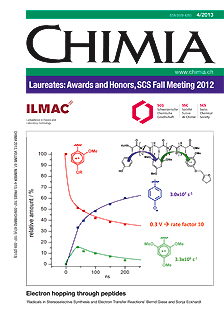Lewis Acid–Water/Alcohol Complexes as Hydrogen Atom Donors in Radical Reactions
DOI:
https://doi.org/10.2533/chimia.2013.250Keywords:
Boron, Hydrogen atom donor, Hydrogen transfer, Lewis acids, Radical reactions, Solvent effect, TitaniumAbstract
Water or low molecular weight alcohols are, due to their availability, low price and low toxicity ideal reagents for organic synthesis. Recently, it was reported that, despite the very strong BDE of the O–H bond, they can be used as hydrogen atom donors in place of expensive and/or toxic group 14 metal hydrides when boron and titanium(III) Lewis acids are present. This finding represents a considerable innovation and uncovers a new perspective on the paradigm of hydrogen atom transfers to radicals. We discuss here the influence of complex formation and other association processes on the efficacy of the hydrogen transfer step. A delicate balance between activation by complex formation and deactivation by further hydrogen bonding is operative.Downloads
Published
2013-04-24
Issue
Section
Scientific Articles
License
Copyright (c) 2013 Swiss Chemical Society

This work is licensed under a Creative Commons Attribution-NonCommercial 4.0 International License.
How to Cite
[1]
G. Povie, P. Renaud, Chimia 2013, 67, 250, DOI: 10.2533/chimia.2013.250.







